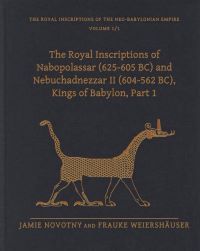Neuerscheinung: The Royal Inscriptions of Nabopolassar and Nebuchadnezzar II
Wir freuen uns, die neueste Veröffentlichung in der Reihe The Royal Inscriptions of the Neobabylonian Empire ankündigen zu können: The Royal Inscriptions of Nabopolasser und The Royal Inscriptions of Nabopolassar (625-605 v. Chr.) and Nebuchadnezzar II (604-562 v. Chr.), Kings of Babylon, Part 1, von Jamie Novotny und Frauke Weisershäuser.
22.07.2024
 Nabopolassar was the first ruler of the Neo-Babylonian Empire. Rising to power from obscure origins, Nabopolassar defeated the Neo-Assyrians, who had controlled Babylonia for more than one hundred years. During the reign of Nabopolassar’s son, Nebuchadnezzar II, the Neo-Babylonian Empire developed into a major superpower. Best known for his ambitious building projects, including the famous Hanging Gardens of Babylon and the Ishtar Gate, Nebuchadnezzar also figures prominently in the Hebrew Bible as the king who destroyed Jerusalem and its temple, conquering Judah and inaugurating the Babylonian captivity.
Nabopolassar was the first ruler of the Neo-Babylonian Empire. Rising to power from obscure origins, Nabopolassar defeated the Neo-Assyrians, who had controlled Babylonia for more than one hundred years. During the reign of Nabopolassar’s son, Nebuchadnezzar II, the Neo-Babylonian Empire developed into a major superpower. Best known for his ambitious building projects, including the famous Hanging Gardens of Babylon and the Ishtar Gate, Nebuchadnezzar also figures prominently in the Hebrew Bible as the king who destroyed Jerusalem and its temple, conquering Judah and inaugurating the Babylonian captivity.
In this book, Jamie Novotny and Frauke Weiershäuser provide updated, reliable editions of seventy-one historical inscriptions of the Babylonian kings Nabopolassar and Nebuchadnezzar II, including nineteen never-before-published texts. Each text edition is accompanied by an English translation, a catalog of all exemplars, a comprehensive bibliography, and commentary containing notes and technical information. The volume also contains a general introduction to the reigns of these two rulers, the corpus of inscriptions, previous studies, and chronology; translations of the relevant passages of several Mesopotamian chronicles and king lists; photographs of objects; and indexes of museum and excavation numbers, selected publications, and proper names.
Featuring meticulous transliterations and translations that have been carefully collated with the originals, this book will be the standard edition for scholars and students of Assyriology, the Neo-Babylonian dialect, and the Neo-Babylonian Empire for decades to come.

